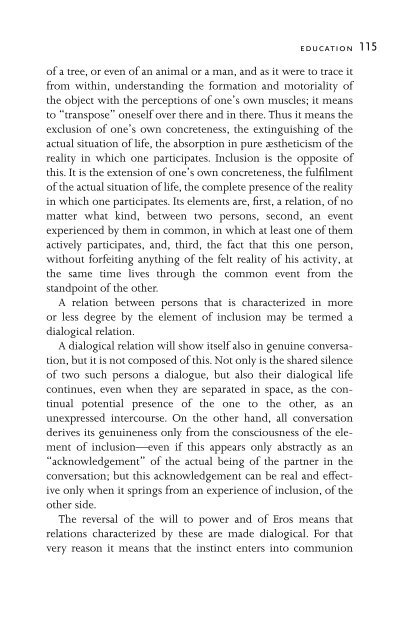Buber, Between Man And Man (In) Bb.pdf - PolkFolk
Buber, Between Man And Man (In) Bb.pdf - PolkFolk
Buber, Between Man And Man (In) Bb.pdf - PolkFolk
You also want an ePaper? Increase the reach of your titles
YUMPU automatically turns print PDFs into web optimized ePapers that Google loves.
education 115<br />
of a tree, or even of an animal or a man, and as it were to trace it<br />
from within, understanding the formation and motoriality of<br />
the object with the perceptions of one’s own muscles; it means<br />
to “transpose” oneself over there and in there. Thus it means the<br />
exclusion of one’s own concreteness, the extinguishing of the<br />
actual situation of life, the absorption in pure æstheticism of the<br />
reality in which one participates. <strong>In</strong>clusion is the opposite of<br />
this. It is the extension of one’s own concreteness, the fulfilment<br />
of the actual situation of life, the complete presence of the reality<br />
in which one participates. Its elements are, first, a relation, of no<br />
matter what kind, between two persons, second, an event<br />
experienced by them in common, in which at least one of them<br />
actively participates, and, third, the fact that this one person,<br />
without forfeiting anything of the felt reality of his activity, at<br />
the same time lives through the common event from the<br />
standpoint of the other.<br />
A relation between persons that is characterized in more<br />
or less degree by the element of inclusion may be termed a<br />
dialogical relation.<br />
A dialogical relation will show itself also in genuine conversation,<br />
but it is not composed of this. Not only is the shared silence<br />
of two such persons a dialogue, but also their dialogical life<br />
continues, even when they are separated in space, as the continual<br />
potential presence of the one to the other, as an<br />
unexpressed intercourse. On the other hand, all conversation<br />
derives its genuineness only from the consciousness of the element<br />
of inclusion—even if this appears only abstractly as an<br />
“acknowledgement” of the actual being of the partner in the<br />
conversation; but this acknowledgement can be real and effective<br />
only when it springs from an experience of inclusion, of the<br />
other side.<br />
The reversal of the will to power and of Eros means that<br />
relations characterized by these are made dialogical. For that<br />
very reason it means that the instinct enters into communion



